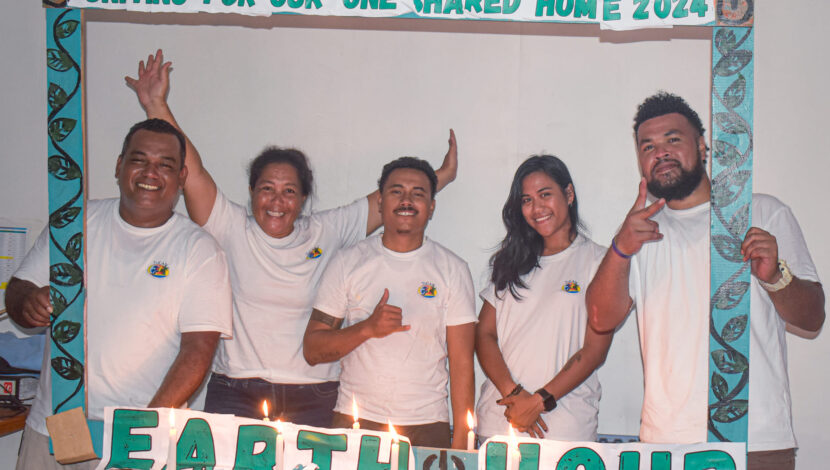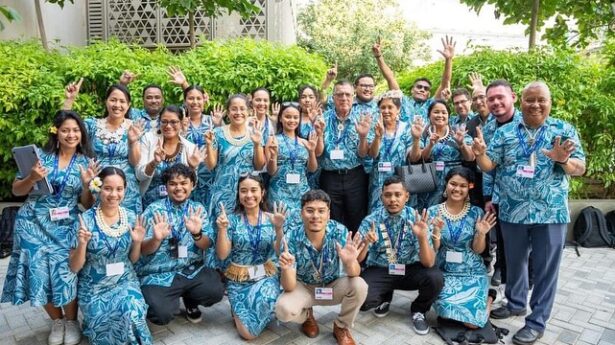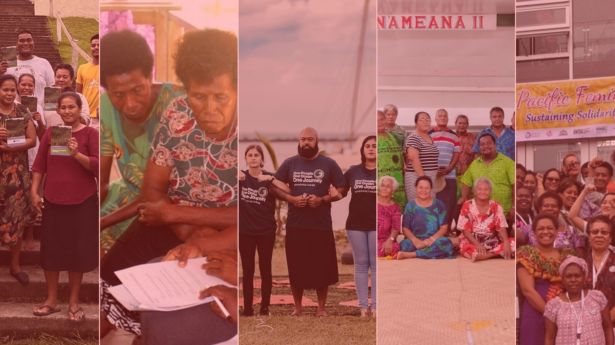The Unitarian Universalist Service Committee advances human rights through grassroots collaborations.
Pacific Leaders Gear Up for Climate Justice Push

By Josh Leach on May 17, 2024
Pacific Island nations are on the front lines of climate change, facing some of the worst and most immediate impacts from a warming globe. To protect their communities and secure justice for these harms, leaders from Pacific nations are planning an ambitious push for climate justice at the major upcoming international climate meetings of the year. UUSC partners in the Pacific are a key part of this effort.
UUSC joined a convening of these movements in Fiji last month. The gathering brought together non-governmental community service organizations (CSOs), political leaders, and other stakeholders from Pacific nations facing climate impacts. Their goal was to coordinate their strategy to ensure their efforts would have the maximum effect at the world’s largest climate meetings later this year, including the Bonn Climate Change Conference in June and the 29th Conference of the Parties (COP 29) meeting, to be held in Azerbaijan in November.
An Unjust Burden
Ever since the global scientific consensus emerged about the likely impacts of human-induced climate change—including rising seas and increasingly severe weather—Pacific nations have been leading the charge to address these challenges. But they should not have to face this burden alone; and the disproportionate costs they are bearing, to try to contain the effects of climate change, should never have fallen on their shoulders.
Pacific nations have done the least historically to contribute to the problem of climate change. The combined greenhouse gas emissions of all Pacific small island developing states is infinitesimal compared to that of the U.S. economy—let alone the entire Global North. Yet, they will face the worst consequences of global warming. Many are already grappling with the loss of territory and other risks to their communities from rising average temperatures.
These disproportionate climate impacts are deeply unfair. Climate change, like other forms of pollution, is the very definition of an “externality”—that is, a negative cost of an economic activity that someone besides the producer is forced to bear. In the absence of global coordination and an agreement to compensate communities equitably for these costs, the people who have done nothing to cause them will end up bearing the burden of paying for them.
The global community has a chance to right this wrong—but to do so, they must listen to the voices of the Pacific leaders who are preparing to address these challenges.
A Climate Justice Strategy from the Global South
UUSC’s Pacific partners and allies have already articulated a comprehensive vision for how the globe can respond fairly to climate change. At the convening in Fiji last month, our partners and other stakeholders helped to flesh out this vision. The following are some of the goals they will be striving to accomplish at this year’s international climate meetings:
- Secure a new social contract. Government, civil society, and the communities they serve must work together to ensure a just, equitable, and sustainable future.
- Recognize that climate change is a human rights issue. Climate change is not some natural process that will affect all people equally. It is a human-engineered problem that will disproportionately harm those communities who are already facing oppression on the basis of race, gender, disability, poverty, and sexual identity. The global community must acknowledge this reality and work proactively to share the costs of combating climate change more equitably.
- Compensate Global South countries for the loss and damage that climate change has already inflicted. Traditional funding strategies for addressing climate change have tended to focus on mitigation (slowing the advance of global warming) and adaptation (helping communities protect themselves from climate impacts). But these categories fail to address the costs many communities around the globe have already borne from climate injustice. Compensating people for loss and damage therefore must be recognized as an essential pillar of global climate financing.
- Phase out all fossil fuels via a just transition. Half-measures and corporate greenwashing will not keep the planet from warming by 1.5 degrees—the limit that scientists say is critical to avoiding the worst impacts of climate change. Our Pacific partners are therefore calling for a complete end to fossil fuel extraction, with a transition that protects people’s livelihoods, rights and dignity. This also means that fossil fuels can’t simply be replaced by other kinds of resource extraction, including so-called “renewable” ones, that similarly harm Indigenous and Global South communities.
- Protect global biodiversity. Climate change is interwoven with other human-caused threats to the planet’s ecosystems, including the devastating loss of biodiversity occasioned by humankind’s destruction of the planet’s other species and their habitats. Pacific leaders are therefore calling on the international community to align their climate action pledges with their stated commitments to protecting biodiversity.
In similar global climate meetings past, Global North governments and powerful environmental advocacy organizations have co-opted some of the language of Pacific leaders, converting them into empty slogans. By convening together in Fiji, UUSC and our partners and allies aim to get out ahead of these efforts by coordinating our advocacy strategy for the year ahead.
These efforts will help ensure that the largest global climate meetings of 2024 will not become another occasion for windy promises and false solutions. Pacific leaders, including our partners, are ready to meet this moment with the ambition it deserves.
You can help support these efforts by contributing to UUSC’s annual fund. A donation to UUSC helps us finance and backstop our partners’ efforts to advance climate justice. You can also sign up to learn more by joining UUSC’s email list. With your support, we can help our partners create a just, sustainable, and livable climate for generations to come.
Image credit: Tuvalu Climate Action Network

